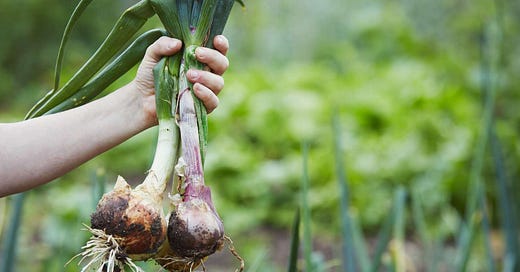It’s April 2023. Sixteen months ago, this landscape was ash from horizon to horizon. On the hilltops, then, giant stringybarks stood as charred, black sentinels—a stark reminder of the inferno that tore through here. Now, through the window of our old shearing shed that somehow survived the blaze, I see those giants shimmering in the sun: beautiful, ghostly silver in death, like a quiet elegy to humanity’s collective folly.
Inside, it’s cold—the kind of damp Austral autumn chill that seeps into your bones. We sit in a circle on mismatched, creaky chairs, shoulders hunched, coats pulled tight. This group has been meeting for 16 months now. We’re gardeners. Growers. Survivors. We come together to share what we’ve grown, pooling our excess for the months ahead.
On this April day, the talk is all about onions. There’s laughter, good-humoured debate over planting techniques, and plenty of stories about what didn’t work in the previous season. As I sit back, hands wrapped around a mug of tea, I take a moment to absorb the scene. This group is as mixed as it gets—QAnon believers, staunch lefties, and a few who just quietly worry about what’s coming next. And me, a climate chaos activist.
I know this group’s varied beliefs about climate change only because I’ve written a book about it. My politics are out in the open, and that gives others licence to approach me—to confront or confirm. When you put pen to paper and publish something in the world, you take on the responsibility to follow the conversation through. That’s the contract. And while it can be tough at times, mostly I’m glad. It’s given me a glimpse into my community I might not otherwise have.
But none of that matters here. What binds us isn’t politics or ideology—it’s our need to prepare, to adapt, and to look each other in the eye and say, ‘We’ve got this.’
The soil has taught me something that parallels. It doesn’t care about your politics. It doesn’t care what god you pray to—or if you pray at all. You dig your hands in, plant a seed, tend it, and watch it grow. That miracle all stems from the millions of microbobes deep beneath the soil’s surface. A universe of life and activity. Being aware of this is deeply present. It’s now. And being present is what we’re doing here. Rooted in reality, our community is growing strong, even in the ashes of what was lost.
Since releasing FIRE, I’m frequently asked: ‘How do you prepare for climate collapse? What should I do?’ My answer feels too simple. Build connections. Build community. You can’t survive what’s coming on your own.
For me, growing food was the entry point. It’s neutral. It’s practical. And in this remote area, with neighbours 10 kilometres apart, it’s what brought us together. Food doesn’t spark arguments; it sparks conversation. And from those conversations, we’ve built something extraordinary. No leaders. No hierarchies. No government imposed reports and audits. Just mutual respect and shared goals, about here and now. That’s as radical and anarchic as it gets.
I know some of you think this isn’t for you. You send me emails saying, ‘I’m too old.’ ‘My health isn’t great.’ ‘I don’t have land or time.’ Here’s the truth: you don’t have to be the one planting onions to contribute.
I’m not young. I’m early retirement age, and yes, growing food is hard graft. But you don’t have to be the grower to support what’s happening. Your skills—whatever they are—matter. Maybe you ‘get’ tech or understand how government agencies work. Perhaps you’re a kickass grant writer. Maybe you’re a sensational organiser who can wrangle schedules like a pro. A community market garden would love all of those skills. Your fingers don’t need to be in the soil to be useful. Community doesn’t need perfection—it needs participation.
And if you’re in the city, don’t dismiss the idea of growing food because you don’t have acres to spare. You’ve got population density, labour, and access to waste for compost. Your community garden can outproduce my small market garden tenfold if it’s done right. Sure, the countryside has space, but we’re spread thin. Our work is solo. What you can build in the city is a powerhouse of resilience.
That said, growing community doesn’t have to mean growing food. It could be about emergency plans, healthcare networks, or education hubs. It’s about recognising what your local area needs and what you can offer. Don’t let politics, divisions, or excuses get in the way. Forget the labels. The person standing in front of you—red or blue—is your neighbour. If you don’t learn to work together now, it’ll be too late later.
Fast-forward to an unseasonably warm Austral November and rooted in reality means harvesting onions today. My hands will be dirty, my back will ache, but under the watch of those beautiful stringybark skeletons, as I hang those onions to cure, every bulb will be a small act of defiance. Every bulb a step toward resilience.
One of my readers nailed it recently: ‘Get off your screen and get into the world.’
What’s your step?






Thanks for making a point that's very true but usually overlooked: that there's lots of ways for people to become involved in local agricultural efforts regardless of their age or ability.
Amazing. You're saying what everyone needs to be hearing.